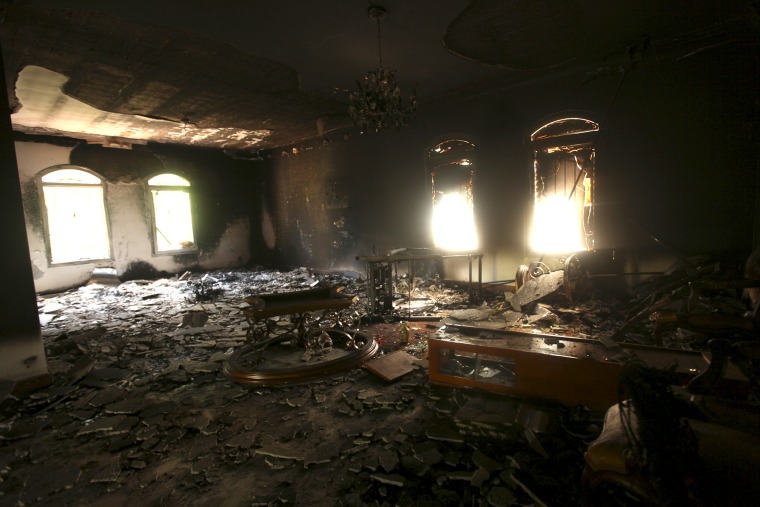After House Speaker John Boehner (R-Ohio) announced there would be a new select committee on the 2012 Benghazi attack, it fell to the House GOP leader to choose which seven members of his caucus would serve on the panel. There are currently 233 House Republicans -- and 206 of them wanted to be part of the committee.
From a distance, it reinforced the impression that GOP lawmakers are united in their zeal to pursue this witch hunt with great enthusiasm. But the Daily Beast reports that behind the scenes, Republicans aren't all on the same page. House Intelligence Committee Chairman Mike Rogers (R-Mich.), for example, warned his GOP colleagues last week about possible pitfalls.
"He was saying this could be a rabbit hole," one House member told The Daily Beast. "He was warning us that we should not let this investigation get into conspiracy theories." Contrary to the caricature of Republicans, as singularly obsessed for political reasons with Benghazi, the reality is quite different. There is deep unease within the Republican leadership that the select committee, which has yet to announce a schedule of hearings, could backfire, and badly.
For all of the recent excitement, the Republican chairs of the House Oversight Committee, House Intelligence Committee, and House Armed Services Committee all balked at the creation of the select committee.
Some of this, of course, is a turf war -- these committees have been investigating the attack in Libya and the new Republican committee effectively yanks the rug from beneath them, arguably because their party was unsatisfied with their progress. It hardly comes as a surprise that they'd be grumbling behind the scenes about losing power over the process. Indeed, I'm rather surprised we haven't seen more articles about their dissatisfaction.
But that doesn't mean they're wrong about the threat of this election-year scheme backfiring.
For one thing, the likelihood of the select committee actually uncovering shocking new information is effectively zero. The deadly violence in Benghazi in September 2012 has been investigated and re-investigated, by multiple agencies and news organizations, to the point that there are no revelations left to learn.
Indeed, the committee's new chairman, Rep. Trey Gowdy (R-S.C.), keeps talking about the key questions he intended to pursue, unaware of the fact that each of his questions have already been answered.
Chances are extremely good that the new committee will simply re-do the work of other committees, leaving the impression that House Republicans wasted a lot of time, energy, and resources for no reason other than creating fundraising fodder and giving Fox News something to do for several months.
But taking a step further, let's also note that none of this is happening in a vacuum -- there are other things House Republicans are supposed to be working on right now. When talking about fear among GOP officials that this scheme "could backfire, and badly," it's not just based on a concern that the Benghazi witch hunt is pointless, but also the fact that this appears to be a substitute for governing.
As we talked about the other day, this election year, House Republicans are effectively declaring they won't pass immigration reform, won't come up with a health care plan, won't consider a credible jobs bill, won't raise the minimum wage, won't consider background checks, won't touch pay equity, won't vote on ENDA, won't create infrastructure jobs, and won't extend unemployment benefits.
They will, however, invest an enormous amount of effort into pursuing a "scandal" they probably recognize as baseless.
Is it any wonder that some in the party are worried about the caucus slipping down "a rabbit hole"? There's been a lot of talk about the GOP's political strategy, but not nearly enough about the GOP's risk.
